#primary identification
Text
Something about humans relating to songs as if they’re the one singing/feeling/identifying them
But Angels relating to music as if they’re being sung to by the singer
#you know what i mean?#human mating music is like me listening to bird mating calls maybe#human and non-human ideas#subtle differences in primary species identification maybe?#🤔
3 notes
·
View notes
Text
I enjoy writing an alien character experiencing gender and sexuality bc most of my characters in future projects will be human, and the only alien character I’ve solidly worked into smth else has amnesia and doesn’t remember their home planet and thus doesn’t remember how alien gender/orientation works. Ford, meanwhile, remembers everything and I like watching him interact with what, to him, is an alien gender (i.e. masculinity/maleness) in a way that he reconciles with the gender he already knows himself to have.
#this has been a self related post#gay alien sunday#like exo is very gender to be sure but exo approaches gender in like#a much more alienated way than ford does#because exo doesn't remember their past and thus doesn't know from memory who they really are#ford knows who he is in a way that exo doesn't#and thus his identification with men (unlike exo's identification with women) isn't motivated by#a sense that he doesn't know who he is if he doesn't align himself with one side of this dichotomy#but is more like an add-on to the identity he already has than a search for primary identity
5 notes
·
View notes
Text
By now, a majority of Autism researchers and clinicians are aware that the existing assessments for Autism are profoundly flawed.
They know the standard evaluation of Autism is sexist, with assessors excluding women for reasons like wearing makeup, having a boyfriend, being superficially polite, or not being fixated on suitably ‘masculine’ topics like ancient Roman history or barometric pressure.
They know Autism evaluations are racist, deeming Black Autistics “oppositionally defiant” or even “borderline” rather than acknowledging any social alienation or sensory pain they’re experiencing, and believing they must be overstating the difficulty they face in moving through the world.
And they certainly know that conventional Autism measures weren’t designed with adult Autistics in mind. Many of us are still asked to make up stories based on paintings of frogs in a toddler’s picture book, when we sit down for assessments at age 20, or 30, or 45 — because all the evaluation methods were written for young kids.
The data has already proven the far-reaching consequences of using such shoddy measures of Autism. People of color, gender minorities, older adults, and women are diagnosed at later ages, and also go undiagnosed at massive rates.
A growing population of scientists are admittedly interested in fostering a new literature of what they call “patient-driven” Autism research, but they never stop thinking of us as mere patients, the passive receivers of care rather than the leaders of communities and political movements who are the ought to be the primary authors of the studies about us, and the sole determinants of what our desired outcomes should be. Even when they observe that their work could benefit from a greater Autistic perspective, researchers do so from closed rooms, filled with other professionals who are largely not Autistic, wondering amongst themselves what it is that we want instead of learning to quiet their voices and follow our lead.
Though many basically well-intentioned Autism researchers believe that Autism assessments need reform, what neurodiversity really needs is to abandon the diagnostic process altogether. If Autism is a benign, neutral, naturally occurring form of human difference that requires acceptance rather than a cure, then there’s no need to diagnose it as if it were a sickness. And if hundreds of thousands of Autistic women, people of color, queer people, and older people have been able to give a voice to ourselves and find one another without having ever been given a label by a professional, then improved professional labeling is not what we need.
Autistic self-realization is the future of Autism assessment. We hold the collective wisdom, organizing ability, insight, and political power to define who we are. No authority figure should have to sign off on our identities.
Because psychiatrists fail to diagnose such a large percentage of the Autistic population, many Autism researchers now accept self-identified Autistic adults within their subject pool. Within the peer-reviewed journal Autism in Adulthood, self-realized Autistics often make up the bulk of the participant sample, and they have repeatedly been found to be indistinguishable from their formally diagnosed peers.
A growing body of research now also considers the presence of Autism-spectrum traits as qualifying for inclusion in many Autism studies. The data makes it quite obvious that Autistic people exist within all human groups, spread all throughout the world, and that a great many people have experiences in common with us who have not been formally diagnosed. This itself reveals that a formal diagnosis is hardly necessary, and that a psychiatric paradigm of accepting self-identification is inevitable. The researchers are increasingly already doing it.
You can read the full essay for free (or have it narrated to you!) at this link.
489 notes
·
View notes
Text
Okay so in the same vein as this post, I want to reality check the people who keep asking (yes I've been this person too, don't @ me) why oh why are Jews the only group leftists are willing to categorically deny self-determination to, and the reason is that most of them are tits deep in Christian supercessionism and don't even know it and have absolutely no desire to change that.
The reason they deny self-determination to Jews is the same reason that they would deny any claim to self-determination of, say, Mormons. If the Mormon church tried to claim Utah because it's the epicenter and birthplace of Mormonism [Edit: apparently the birthplace of Mormonism is western New York and not Utah whoops, but the point stands] and therefore they may as well have an indigenous claim to it, people with brains would rightfully lose their shit.
"But it's a culture too, not just a religion!"
So? Have you met any Mormons and spent time with them? They have their own culture.
"Okay but Jews are an ancient people!"
Please look at the batshit Mormon theological view of the Twelve Tribes and their attitudes towards Native Americans.
"Okay but our history is real!" Yep! These people don't know the first thing about Judaism and Jewish history and don't care.
The reality is that most westerners are hellbent on ignoring Jewish history and ethnoreligious identity because literally all of western civilization is built on Christian supercessionism. Even the people who leave Christianity and hate it (and "all religions") with a violent passion still refuse to engage in learning about Jewish cultural and ethnic history because you cannot do it without engaging the history and texts that they blame as the roots of Christianity and therefore they discredit all of it out of hand.
Obviously they're super fucking wrong about this. You, my fellow yid, and I, both know that. But unraveling the supercessionism means understanding their culpability in Jewish suffering and how they benefit from institutionalized antisemitism.
They are extremely unlikely to do that.
Why? Because if they unlearn Judaism as "just a religion" &/or "Christianity without Jesus" and begin to understand it as an indigenous Levantine group, they then have to reckon with the reality of how much Christianity has stolen from Jews and how much of their hatred for Jews is baked into their western goyische psyche by intentional Christian misunderstandings of Judaism.
Am Yisrael cannot to them be a real people with deep tribal roots and a strong culture, because then they would have to separate Judaism from Christianity and question their assumptions about us and our history.
"But Judaism accepts converts!"
Okay, as someone who "converted," I'm going to say no, not really, actually. Conversion is a convenient shorthand, but it's not accurate. Converting to Judaism means a mutually consensual adoption into the Tribe, after thorough vetting, at least a year of study and perseverance but probably more, and the main, primary promise that you make is about choosing to share the collective fate of the Jewish people. Yes, this adoption and naturalization is through the medium of the spiritual/religious aspect of Jewish identity, but it's way more than that. To be a Jew is to know that I might get stabbed on my walk to shul for being visibly Jewish, and to accept that possibility because the idea of not living as a Jew is worse. Gerim have to be ride or die because a serious chunk of Jewish history is on the "die" side of that equation. You have to be just a little bit nuts voluntarily take on that risk (reminder that I say this as a ger who is happily Jewish) and it must come from a place of profound love for and identification with the Jewish people. And once you join the family, that's it. You don't get to ever stop being a member of the family, even if you become estranged from it.
It's a people, with a deep history and culture, and anyone who joins it takes on both. Obviously your genetic makeup and ancestry don't change, but everything else does.
Understanding that major difference in Judaism in a serious way means that they would have to let go of their world view that their religion and culture are separate, that Christianity intentionally divorced faith from culture in order to acquire as many converts as possible, and then begin to understand how Christianity has shaped their understanding of culture, tradition, what religion is, ethics, and values. And they would have to then make an effort to separate their understanding of Judaism and what they think they know about us from Christianity, however they do or don't relate to it.
411 notes
·
View notes
Text
Theories of the holy shit what did I just see back there on the street?
Because transmisogyny makes them so impossible to ignore, for at least the last 70 years transfeminized people have served as key material of Anglo-American gender/queer/trans theories, as laundered through anthropology, sexology, and uncited personal witnessing. The anaemic denial of this fact through snappy and surface-level distinctions between ‘queer’ and ‘trans’ and between different transfeminized groups has made it functionally impossible for these theories to seriously account for transf* life, and this failure is highly productive, because it allows for the continued use of both ‘premodern’ ‘third gender’ and ‘postmodern’ transgenderism as lobotomized material for the theories of other people. The last century of gender theoretic development has revolved around slowly refining methods of extracting transfeminized peoples’ insight, forgetting and re-introducing them to their field over and over again to frame them as perpetual novelties, leading to a pernicious form of feminist amnesia that repeats over and over again.
1 . MARGARET MEAD (1949)
The work begins with Margaret Mead, the ‘most famous anthropologist of our century’ (Behar and Gordon 1996), who made her career studying indigenous groups in Samoa and New Guinea, then joined the larger anthropological effort to inform the US Government’s genocidal re-education campaigns against Indigenous American tribes. She later enjoyed a prodigious career as a public intellectual and shifted to more explicitly feminist writing which extensively influenced the movements of the 60s and 70s. Mead argued that essentially all sex-gender roles were culturally determined, and used the specter of the transfeminized homosexual-transvestite both to make that argument and to advocate for gender abolition.
This can be seen most clearly in Mead’s 1949 book Male and Female: a Study of the Sexes in a Changing World. Mead chronologically traces individual gender development through an ethnographic-sexological narrative, beginning with ‘first learnings’ that a child receives primarily through observation. Then the family comes in, and the transvestite comes with it, existing as the primary motive (alongside Freudian sexual attachment) which motivates gendered socialization:
Too great softness, too great passivity, in the male and he will not become a man. The American Plains Indians, valuing courage in battle above all other qualities, watched their little boys with desperate intensity, and drove a fair number of them to give up the struggle and assume women’s dress. (Mead 1949)
Mead argues that “fear that boys will be feminine in behavior may drive many boys into taking refuge in explicit femininity,” but makes a distinction between this identification and what she calls ‘full transvestitism,’ the culturally-specific recognition of that status. This differential leads her to conclude that the physical traits seen as markers of ‘gender inversion’ are culturally specific, and that what is understood as physical sex (then existing on a ‘spectrum’ model) is therefore partially socially determined.
For Mead, gender must be abolished precisely because of the fact that she could even make this argument. As she says,
Only a denial of life itself makes it possible to deny the interdependence of the sexes. Once that interdependence is recognized and traced in minute detail to the infant’s first experience of the contrast between the extra roughness of a shaven cheek and a deeper voice and his mother’s softer skin and higher voice, any programme which claims that the wholeness of one sex can be advanced without considering the other is automatically disallowed.
The desperate need to reproduce these distinctions, to make sex clear and visible and obvious, leads Mead to ultimately argue for a gender abolition that rests on complementary sex-roles. The main benefit of this approach for Mead is the complete eradication of sex-gender ‘confusion’ and its incarnation in transfeminized people, so associated precisely because of their intense usefulness as a tool for undermining sex-gender distinctions. So Mead sees the construction of physical and social gender by using transfeminized people as a lens, but because of her own disgust she can only fix gender by unseeing it again, by displacing gender to ‘real’ physical sex and protecting herself by breaking the tool. This, unsurprisingly, leaves her exactly where she started.
2. BETTY FRIEDAN (1963)
The feminist theorists that came after Mead directly confronted this reversion to ‘complementary sex’ logics, most notably in Betty Friedan’s foundational work The Feminine Mystique. Friedan discusses the ‘paradox’ of Mead’s influence, the strange combination of her exposure of ‘the infinite variety of sexual patterns and the enormous plasticity of human nature’ and her ‘glorification of women in the female role – as defined by their sexual biological function.’ In the middle, Friedan cites a page-long quote describing a point of ambivalent warning in Mead’s writing:
The difference between the two sexes is one of the important conditions upon which we have built the many varieties of human culture that give human beings dignity and stature… Sometimes one quality has been assigned to one sex, sometimes to the other. Now it is boys who are thought of as infinitely vulnerable and in need of special cherishing care, now it is girls… Some people think of women as too weak to work out of doors, others regard women as the appropriate bearers of heavy burdens “because their heads are stronger than men’s” … Some religions, including our European traditional religions, have assigned women an inferior role in the religious hierarchy, others have built their whole symbolic relationship with the supernatural world upon male imitations of the biological functions of women. (emph added by me)
...Are we dealing with a must that we dare not flout because it is rooted so deep in our biological mammalian nature that to flout it means individual and social disease? Or with a must that, although not so deeply rooted, still is so very socially convenient and so well tried that it would be uneconomical to flout it…
...We must also ask: What are the potentialities of sex differences? … If little boys have to meet and assimilate the early shock of knowing that they can never create a baby with the sureness and incontrovertibility that is a woman’s birthright, how does this make them more creatively ambitious, as well as more dependent upon achievement?
Friedan attributes this ultimate focus on sexual difference to Mead’s Freudianism: she argues that Mead’s need to approach culture and personality through sexual difference, combined with her anthropological understanding that ‘there are no true-for-every-culture sexual differences except those involved in the act of procreation’ (Friedan and Quindlen 1963), combines to cause her to inflate the cultural importance of the reproductive role of women. Friedan intensely rebukes this reification of reproduction as another component of the ‘feminine mystique’ (very close to the modern ‘divine feminine’), advocating for programs which enable women to reject the mystique and housewife status and to seek education and employment, to combat the problem ‘which had no name’ but takes shape through spikes in female ‘sex-hunger’ and ‘overt manifestations’ of passive male homosexuality, both understood as ‘children acting out the sexual phantasies of their housewife-mothers.’ In a paradoxical return to Freudianism, Friedan characterizes husbands unwilling to let their wives work as being seduced ‘by the infantile phantasy of having an ever-present mother’ (the Freudian homosexuality-signifier), associating antifeminism with passive homosexuality with femininity which the aspiring feminist has escaped, learning to compete “not as a woman, but as a human being.”
3. THE MULTIPLICATION OF TRANSFEMINIZED SUBJECTS
As we can see, transfeminized subjects are frequently used as signs of system collapse, hypervisible enough to be easy examples and potent enough to rhetorically corrode existing sex-gender systems in preparation for the author’s own vision. Once a piece is published, these examples are usually then forgotten, assumed as scaffolding for the real theory; but the rhetorical strawmen of these transfeminized subjects still remain, trapped implicitly in the text, and they bleed into one another with every new addition to the corpus, every call to action invoking a new transfeminized archetype.
So far we have seen Mead’s anthropological-orientalist framing of ‘transvestitism’ among the anthropological Other and Friedan’s psychological framing of ‘passive homosexuality’ in the United States. The increasing visibility of adult ‘transsexuality,’ somewhat disjoint from the developmental sexology Gill-Peterson (2017) discusses because of its visibility in high-profile cases like Christine Jorgensen, was likewise framed for theory. Harold Garfinkel’s (1967) book Studies in Ethnomethodology, which described methods for observing ‘the objective reality of social facts as an ongoing accomplishment,’ used an intersex woman named Agnes as an avenue to expose how everyday social facts are constructed. Agnes was an ideal exemplar because her insistence on getting HRT and being seen as a woman was considered psychologically normal: “Such insistence was not accompanied by clinically interesting ego defects. These persons contrast in many interesting ways with transvestites, trans-sexualists, and homosexuals.” Of course, Garfinkel was later notified that Agnes did not have an intersex condition, and he then noted that ‘this news turned the article into a feature of the same circumstances it reported, i.e. into a situated report.’
Anyways, now it’s time for yet another transfeminized subject: the ‘transsexually constructed lesbian feminist.’
4. JANICE RAYMOND (1979)
As with her predecessors, Raymond sees analytical power in her particular transfeminized group, arguing that “transsexualism goes to the question of what gender is, how to challenge it, and what reinforces gender stereotypes in a role-defined society.” But she also has some concerns for ‘transsexual women,’ initially assumed heterosexual, none of which are particularly novel or interesting. Now that she’s writing in an environment dominated by Friedan’s mandate towards shedding femininity, feminist amnesia makes it novel to regurgitate Margaret Mead’s responses: that “male transsexualism may well be a graphic expression of the destruction that sex-role molding has wrought on men,” and that “men recognize the power that women have by virtue of female biology and the fact that this power, symbolized in giving birth, is not only procreative but multidimensionally creative” (Raymond 1979).
Her analysis of (new archetype) ‘transsexually-constructed lesbian feminism’ is much more interesting. While Raymond can understand heterosexual transsexual women as ‘reinforcing gender stereotyping’ by pulling primarily from medical archives already hegemonized by gatekeeping and passing requirements, the transsexual women in the lesbian-feminist movement achieved a certain degree of personal contact and visibility that undermined ‘hegemonizing’ logics. So Raymond uses three main arguments: an essentialist appeal to fundamental ‘maleness,’ a red-scare-esque appeal to transsexual lesbian feminists as ‘court eunuchs’ bent on monitoring and controlling feminist spaces, and finally, an argument that transsexual lesbian feminists are fundamentally epistemically corrosive to lesbian feminist spaces:
Whereas the lesbian-feminist crosses the boundary of her patriarchally imposed sex role, the transsexually constructed lesbian-feminist is a boundary violator. This violation is also profoundly mythic, for as Norman O. Brown writes of Dionysus, he as the ‘‘mad god who breaks down boundaries.’’
Contrary to contemporary transmisogynistic discourse which frames trans lesbians as personal threats to women in lesbian-feminist spaces, this violation takes its form not in any particular act but in the act of passing, the deconstructive question this existence seemingly automatically places on lesbian-feminist spaces:
One of the most constraining questions that transsexuals, and, in particular, transsexually constructed lesbian-feminists, pose is the question of self-definition—who is a woman, who is a lesbian-feminist? But, of course, they pose the question on their terms, and we are faced with answering it.
Raymond notes with some frustration that this transsexual question has been discussed ‘out of proportion to their actual numbers,’ using up valuable feminist energy, and frames this as a symptom and crime of transsexual lesbianism itself. The trans question is transsexual women; like the theorists before her, she sees transfeminized people as a gaping hole in the gendered world, but now they’re inside her house, feeding “off woman’s true energy source, i.e., her woman-identified self,” and inherently stand to break “the boundaries of what constitutes femaleness,” to dissolve lesbian-feminism itself.
I want to stress two main points in all of this. First, Raymond understands studying transsexualism as a crucial tool for answering ‘the question of what gender is’ and ‘how to challenge it.’ Second, Raymond’s anxiety about transsexual lesbian-feminists moves away from specific actions and towards the ‘penetration’ inherent in their existence in these spaces at all, the understanding that transsexual women are inherently corrosive to lesbian-feminist movements. These two points are clearly linked. Raymond understands transsexuality as a form of epistemic gender acid, something that can be useful at arm’s length but is deadly up close. Of course, the transfeminized people she discusses were not necessarily invested in asking the Trans Question themselves; trans women attended lesbian-feminist events like Michfest before and after their trans exclusion policies, and regardless of ‘passing’ many people enjoyed a form of don’t ask don’t tell (Tagonist 1997). But within these spaces, the Trans* Question long predated the actual existence of transfeminized people – so once they arrived, the Question and person were fundamentally linked. Trans theorists have negotiated this association extensively, but that’s not the topic of this essay, so I’ll leave you with some sources (Stryker 1994; Stone 1992) and move to Butler.
5. JUDITH BUTLER (1990)
This work has been done already by Vivian Namaste (2020), who argues that “contemporary discussions of Anglo-American feminist theory, exemplified in Butler’s work, begin with the Transgender Question as a way to narrow our focus to the constitution, reproduction, and resignification of gender.” This singular focus on the ‘Transgender Question’ has made it functionally impossible for Anglo-American feminist theory to consider the outsized role of work, particularly sex work, in motivating the discrimination and violence against transfeminized people of color: “framing violence against transsexual prostitutes as ‘gender violence’ is a radical recuperation of these events and their causal nature-a violence at the level of epistemology itself.”
Namaste attributes this focus on featureless ‘gender violence’ to a crippling lack of empiricism, a lack of researcher-subject equity, and an exclusion of subject knowledges. She provides an effective power-based solution to this epistemic violence – that feminist theorists should talk with the subjects of their theory and give them some measure of power in the transaction – a sort of endpoint analysis which means she doesn’t need to consider too much of the internals of the system she’s challenging. That’s a good idea for her work, but with the benefit of history we can move differently. The next section synthesizes Butler, Friedan, Mead, and Raymond together to provide a functionalist analysis of the feminist theoretic use of transfeminized people. What are the benefits of using transfeminized people as an epistemic tool in feminist theory? What are the dangers of using this epistemic tool, and how does feminist theory manage those dangers?
6. PATTERNS OF EXTRACTION AND DEFENSE
Looking past Butler and further into the past reveals that transfeminized people have been crucial not just to the feminist theory of the past 20 years, but have served as exemplars as far back as the 1940s. The ‘Trans* Question,’ which frames transfeminized people as the most visible signifier and most horrifying symptom of social gender, has been cyclically used in a form of feminist cultural amnesia:
A transfeminized group serves as a hypervisible example to 'deconstruct' social gender
Transfeminized deconstruction bloats beyond itself, undermining 'sex traits' or 'femaleness' or some other foundational category of feminist analysis.
Reconstruction of gender as 'biological sex,' alliance between feminist theorists and men of all stripes by arguing that post-gender eradication of transfeminized people will (a) allow men to be feminine without becoming women or (b) destroy femininity entirely.
New-generation feminist theorists realize their predecessors have reinvented social gender. Return to (1).
As Margaret Mead’s work shows, the use of transfeminized groups to deconstruct both physical and social gender has been observed regardless of transmedicalization. This helical pattern has a few general properties:
Each cycle introduces a distinct transfeminized group, positioning it against prior groups as uniquely suitable for analysis, but simultaneously blurs the new group into the existing melange.
This "Trans* Queston" is almost entirely devoid of group-specific context and rooted in transmisogyny, which positions them as horrifying and visible symptoms of social gender.
Each "Trans* Question" initially exposes social gender, but constantly threatens to dissolve other categories or even the theorist's own writing as socially constructed, against the theorist's will.
Each new cycle demonstrates near-complete historical amnesia as to the relevance of transfeminized people in the prior theoretical move.
So the “Trans* Question” allows for the basic feminist move, asserting that gender is socially constructed, but if improperly controlled it stands to dissolve virtually any definition feminist theorists try to build. To be clear, I do not believe in the total deconstruction of categories – you need definitions, even ones you acknowledge as imprecise, to say anything at all. But transfeminized people probably have pretty solid ideas about gender, having to, you know, live with it. The alienated ‘Trans Question*’ has none of this insight, appearing instead as a gaping epistemic hole in the world, and so feminist theorists are forced to come up with complicated quarantining measures to keep the Question from spilling over.
What jeopardizes feminist theory’s use of the Question? One answer (among many) comes by looking at Mead, who concluded that physical characteristics seen as ‘sex traits’ were socially constructed by looking at the culture-specific construction of what she called ‘full transvestitism.’ In this case, the Question undermined sex when the social position of transfeminized subjects were seen as simultaneously normative and anti-normative, existing in some normative ‘social’ role while being understood as distinct from non-transfeminized subjects via another ‘natural’ axis. The fact that these splits were made differently across different transfeminized groups undermined the distinction between social and ‘natural/biological’ aspects of gender, and because the alienated Question provides no means of making anything solid out of any of this, Mead retreated to the womb.
So understanding that the Question allows for the deconstruction of gender, and that it overgrows when multiple (studied as) semi-normative transfeminized groups are cross-compared with one another, we can consider aspects of contemporary feministqueertrans theory that enforce the epistemic isolation and normativization/antinormativization of transfeminized groups. The knots this ties in feminist theories seem relevant both to the ‘why does trans theory exist’ question posed by Chu & Drager (2019) and to the challenges and limitations of applying queer/trans theory to groups outside the anglosphere (Chiang 2021, Savci 2021). I’ll discuss that more in another essay.
SOURCES
Behar, Ruth, and Deborah A. Gordon. 1996. Women Writing Culture. First Edition. Berkeley: University of California Press.
Chiang, Howard. 2021. Transtopia in the Sinophone Pacific. Columbia University Press.
Chu, Andrea Long, and Emmett Harsin Drager. 2019. “After Trans Studies.” TSQ: Transgender Studies Quarterly 6 (1): 103–16. https://doi.org/10.1215/23289252-7253524.
Friedan, Betty, and Anna Quindlen. 1963. The Feminine Mystique. Reprint edition. New York: W. W. Norton & Company.
Garfinkel, Harold. 1967. Studies in Ethnomethodology. 1st edition. Cambridge Oxford Malden,MA: Polity.
Gill-Peterson, Jules. 2017. “Implanting Plasticity into Sex and Trans/Gender.” Angelaki 22 (2): 47–60. https://doi.org/10.1080/0969725X.2017.1322818.
Mead, Margaret. 1949. Male and Female: A Study of the Sexes in a Changing World. First Edition. William Morrow.
Namaste, Viviane. 2020. “Undoing Theory: The ‘Transgender Question’ and the Epistemic Violence of Anglo-American Feminist Theory.” In Feminist Theory Reader, edited by Carole McCann, Seung-kyung Kim, and Emek Ergun, 5th edition. New York, NY London: Routledge.
Raymond, Janice G. 1979. The Transsexual Empire: The Making of the She-Male. New York: Teachers College Press.
Savci, Evren. 2021. Queer in Translation: Sexual Politics Under Neoliberal Islam. Durham (N.C.): Duke University Press Books.
Stone, Sandy. 1992. “The Empire Strikes Back: A Posttranssexual Manifesto.” Camera Obscura: Feminism, Culture, and Media Studies 10 (2 (29)): 150–76. https://doi.org/10.1215/02705346-10-2_29-150.
Stryker, Susan. 1994. “My Words to Victor Frankenstein Above the Village of Chamounix: Performing Transgender Rage.” GLQ: A Journal of Lesbian and Gay Studies 1 (3): 237–54. https://doi.org/10.1215/10642684-1-3-237.
Tagonist, Anne. 1997. “Sister Subverter Diary August ’97.” Unapologetic: The Journal of Irresponsible Gender.
192 notes
·
View notes
Text
❝forgotten memories❞

✭ pairing : Lester Sinclair x reader x Bo Sinclair x Vincent Sinclair
✭ fandom : slashers
✭ summary : whiles out hunting Lester comes across a beaten and battered young lady in serious need of medical attention so what does he do? He takes the little lass back to his hometown to get treated by his brothers, but she happens to wake up and at first they expect her to freak out since she’s surrounded by three men but the only thing on her mind is why can’t she remember anything but her name
✭ authors note : art work by @kasiawoe found it on Pinterest also this was requested by @shadowraven-02 you sent this in to @fandomnationwhore a while back and I’m here to fulfill it since I’ve taken over doing some of their top requests :) if at any moment you wish to be untagged, do inform me as I have no problem with it I just thought I’d tag you and let you read what you sent in
✭ slasher masterlist

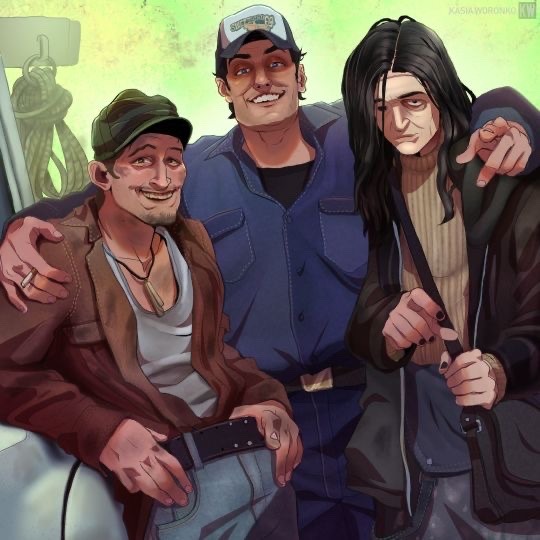

Lester Sinclair had always found solace in the woods. The dense canopy of trees, the gentle rustling of leaves, and the distant calls of woodland creatures were a symphony of tranquility. It was his sanctuary, a place where he could escape the demands of his hectic life and find a sense of peace.
On this crisp autumn morning, with the sun barely peeking over the horizon, Lester set out for a hunting expedition. He carried his rifle with practiced ease, each step taken with a careful consideration of his surroundings. His brothers, Bo and Vincent, would join him later, but for now, he relished the solitude.
As he ventured deeper into the forest, Lester's keen eyes caught sight of something unusual amidst the fallen leaves. There, sprawled on the ground, was an unconscious young woman. Her clothes were torn, and her face was marred by a bleeding wound on her forehead. It was a sight that sent a jolt of concern through Lester.
Kneeling beside her, he carefully examined her condition. She was still breathing, albeit shallowly, which was a relief. Gently, he brushed her hair away from her face, revealing her pale complexion. Concern etched his features as he noticed the deep bruises marring her arms and legs. It was clear that she had been through some kind of ordeal.
Lester's instinct to help kicked in immediately. He knew he couldn't leave her here, injured and alone in the woods. Carefully, he reached into her pocket and found her wallet. Opening it, he discovered her identification. Her name was (Y/N), a medical student still in college.
With determination in his eyes, Lester decided to take action. He scooped her fragile form into his arms, cradling her gently. She was surprisingly light, making it easier for him to carry her. As he began to make his way back to his pickup truck, he couldn't help but wonder how she had ended up in such a dire situation.
The journey back to his home felt like an eternity, the forest passing by in a blur of green and brown. Lester's mind raced with questions, but his primary focus was ensuring (Y/N)'s safety. He knew his brothers would be just as concerned as he was when they saw her.
When he finally reached the old, rustic house that he shared with Bo and Vincent, Lester carefully carried (Y/N) inside. The warmth of the living room enveloped them, a stark contrast to the cool autumn air outside. With great care, he laid her down on the couch, his worry deepening as he took a closer look at her injuries.
Bo had been planning to join Lester for the hunting trip, but he arrived later than expected. He pushed open the creaky front door of their rustic home, a cheerful greeting on his lips. "Lester, you out here, buddy?" he called, stepping into the warm and cozy living room.
His voice trailed off when he laid eyes on the unexpected scene before him. His gaze fixed on the unconscious girl lying on the couch, her disheveled appearance a stark contrast to the familiar surroundings.
"Who the hell is she?" Bo blurted out, his voice tinged with some kind of emotion though Lester wasn’t sure what.
Lester turned toward his brother, his eyes filled with a mixture of worry and confusion. "I found her out back in the woods," he explained, "She was unconscious, and there are bruises on her, and she had this nasty wound on her forehead."
Just as their argument started to brew, the connection between the twins kicked in. Vincent, who had been working away in the basement workshop, felt Bo's growing frustration through their twin link. He abandoned his tools and made his way upstairs, his face a mask of concern. He signed, asking if everything was alright.
Bo's agitation was clear in his voice as he responded to Vincent's silent inquiry. "No, Lester here is putting us all in danger."
Lester frowned at Bo's accusation. "How am I putting us in danger?" he retorted, his voice rising in frustration.
Their argument continued, voices escalating, as neither brother noticed the subtle movement on the couch. (Y/N) began to stir, her eyelids fluttering open. She blinked in confusion, disoriented by her surroundings and the voices she heard. Her vision was blurry at first, but gradually, the room came into focus.
Vincent, who had been watching the argument unfold, suddenly noticed her awakening. He took a step back, positioning himself between Bo and the girl, his curiosity piqued. He wanted to observe her reaction before drawing attention to her presence.
As (Y/N) began to regain consciousness, she felt a dull ache in her head, which sent a wince across her features. Her eyes slowly adjusted to the room, and as she sat up, she couldn't help but notice the three men now staring at her. Their expressions ranged from concern to curiosity, and she blinked owlishly at them, her confusion evident.
"Where am I?" she asked, her voice slightly shaky.
Lester, the one who had found her, stepped closer and replied, "You're in my home. We found you in the woods unconscious, and you had some injuries, so we brought you here."
(Y/N) furrowed her brow, trying to piece together the events leading to this moment. "How did I get here?" she wondered aloud.
Bo, ever the standoffish one, folded his arms and said, "That's exactly what I'd like to know too."
Vincent, who had been observing silently, stepped forward and signed a question, his hands gracefully moving through the air. However, (Y/N) was caught off guard by the unfamiliar gesture and simply responded with a confused "Huh?"
Lester quickly intervened, introducing his brother. "That's Vincent," he explained, "He was just asking if you're okay."
Still somewhat disoriented, (Y/N) nodded uncertainly. "I think so?" She winced again, a hand gingerly touching the bandage on her forehead. It was clear she had many questions, but her priority was trying to make sense of the situation and her surroundings.
“So how did you get out there.” Lester asks, he watches her brows clench and that’s when his concern deepened as he watched (Y/N) struggle to recall her recent past. He leaned closer and gently asked, "I mean do you remember how you ended up out here in the woods? You're pretty far from town."
(Y/N) closed her eyes, trying to summon any memories that could explain her current situation. However, her efforts were in vain, and her frustration grew as she shook her head, her voice trembling as she admitted, "No, I don't remember."
Bo, always quick with a sarcastic remark, couldn't resist but quip, "Does she even know anything?"
(Y/N), taking Bo's question more seriously than intended, felt panic start to creep in. She tried to think back to her life, her home, her studies, but everything seemed to be shrouded in darkness, leaving only her name as a lone beacon of familiarity. Tears welled up in her eyes as the realization sank in that she couldn't recall anything else.
Vincent, noticing (Y/N)'s distress, reacted impulsively. He smacked Bo on the arm and then swiftly signed at him, "Look, you made her cry."
Bo's temper flared. "I ain't do a goddamn thing to that girl!" he retorted, defensive.
Lester, always the voice of reason among the brothers, interjected firmly, "Enough, you two! We need to help her, not argue." He moved closer to (Y/N) and spoke in a soothing tone. "Hey, it's okay. We'll figure this out together. Take a deep breath."
He reached out to offer her a comforting hand on her shoulder, hoping to ease her panic and bring some clarity to the situation.
Lester gently held (Y/N) in his arms, offering her a comforting embrace as she cried out her fear and confusion. His heart went out to her as he whispered soothing words. "It's okay, (Y/N), you're safe here. Everything's going to be alright. This is just a hiccup in the road. You'll remember, I'm sure of it."
She clung to his words, her sobs gradually subsiding. In his arms, she found a flicker of solace amidst the storm of her lost memories and newfound uncertainty.
Meanwhile, Bo's frustration had not subsided. He was growing increasingly impatient and wary of the stranger in their midst. He couldn't shake the feeling that (Y/N) was a threat, not just to Ambrose, but to all of them.
In the quiet of the kitchen, Bo took Lester and Vincent aside, his tone hushed but determined. "We need to get rid of her," he declared, his voice filled with urgency.
Lester frowned deeply, appalled by his brother's suggestion. "Bo, we can't just... get rid of her. She's clearly in trouble, and we need to help her."
Bo's eyes narrowed, his frustration boiling over. "She's a danger to Ambrose, and she's a danger to us all. We don't know who she is or what happened to her. We can't trust her."
Vincent, ever the voice of empathy and caution, hesitated. He signed his thoughts, "We need to be careful, but killing her? Don’t you think that’s a bit much?”
Bo was unwavering. "Think about it, Lester. We have no idea who she is or what she's involved in. We can't risk our safety, or Ambrose's."
Lester shook his head firmly. "No, Bo. I won't do it. We'll help her, keep her safe until she remembers. We can't resort to violence."
The tension in the kitchen grew palpable, as the three brothers faced a difficult decision that would shape their future and the fate of the mysterious (Y/N).
Bo's frustration reached its peak, and he reluctantly conceded. "Fine," he grumbled, his jaw clenched. "But she's your responsibility, Lester."
With those words, Bo turned on his heel and stormed out of the kitchen, the door slamming shut behind him. Vincent, sensing his twin's anger and knowing that arguing further would only escalate the situation, hurriedly followed, hoping to calm Bo down and find some common ground.
Lester was left alone in the kitchen, his thoughts swirling as he watched his brothers leave. He knew that taking care of (Y/N) was a responsibility he was willing to shoulder, even if it meant facing uncertainty and danger. She needed their help, and he was determined to be there for her, no matter what challenges lay ahead.
#x reader#x reader one shot#x reader oneshot#lester sinclair#lester sinclair imagine#lester sinclair imagines#lester sinclair x reader#lester sinclair x you#lester sinclair x y/n#bo sinclair#bo sinclair imagine#bo sinclair imagines#bo sinclair x reader#bo sinclair x you#bo sinclair x y/n#vincent sinclair#vincent sinclair x you#vincent sinclair x reader#vincent sinclair x y/n#house of wax#house of wax imagine#house of wax imagines#house of wax x reader#slashers masterlist#slashers imagine#slashers imagines#slashers x you#slashers x reader#slashers x y/n#house of wax x y/n
192 notes
·
View notes
Text
The Israeli attack on a humanitarian convoy in Gaza in early April that killed seven aid workers with the U.S.-based aid group World Central Kitchen has ignited a fierce global backlash against Israel’s policies of engagement in the territory. The attack involved the successive firing of three missiles at three vehicles, driven by suspicions of a Hamas combatant’s presence within the convoy, according to reports.
In Israel, the event is being portrayed as an accident, “a grave mistake stemming from a serious failure due to a mistaken identification, errors in decision-making, and an attack contrary to the Standard Operating Procedures,” as the Israeli military’s investigation team concluded. In humanitarian circles, it is seen as evidence of a culture that “treats Gaza as a free-fire zone with total impunity for gross attacks on civilians,” as Jeremy Konyndyk, the president of Refugees International who served in both the Obama and Biden administrations, has suggested.
But for the discussion to be useful, it should progress beyond these immediate interpretations to examine the deeper cultural patterns underlying such incidents. Most crucially, it must scrutinize the shift in military policy and ethos that can be traced back to the Elor Azaria affair of 2016-17. Azaria was an Israeli conscript who was captured on video executing a wounded and immobilized Palestinian assailant in Hebron. The Israeli military prosecuted Azaria for manslaughter and sentenced him to 18 months in prison.
While the case demonstrated the military’s commitment to its own ethical codes, it also sparked widespread protests from right-wing factions and a general backlash against military procedures. The army was accused of failing to support Azaria and creating a culture in which soldiers would hesitate to use force against Palestinian militants. To counter this claim, and from that point forward, the military began to announce the number of Palestinian fighters killed in its operations, demonstrating that its forces did not hesitate to engage.
Under the leadership of the military’s chief of staff, Aviv Kochavi, from 2019 to 2023, the killing-based criteria were reinforced. Kochavi’s goal was to remake the army into a “lethal, efficient, and innovative” fighting force—in other words, a death-generating army. He promoted this vision by enhancing the precision of weapon systems, improving the coordination between forces and intelligence, and increasing the rate of fire.
Kochavi’s directive for field commanders to assess, at the end of each combat phase, the number of enemy forces killed and objectives destroyed—rather than solely focusing on territorial conquest—signified a shift toward necrotactics, where the primary goal of military engagement is killing the enemy. Killing becomes not just an outcome of warfare but its principal aim.
The approach of using body counts as a metric of success has notably intensified during the current war. Soon after the Oct. 7 attack, the Israeli military began consistently reporting the number of Hamas fighters killed, echoing the way U.S. generals announced enemy fatalities during the Vietnam War—a scenario where traditional metrics for evaluating combat success are elusive, thus making the body count, rather than the strategic objectives achieved, the primary indicator of success. This was particularly evident as the Israeli death toll ticked up and the stated objective of dismantling Hamas appeared increasingly unattainable.
In fact, the military appears to have established a quantitative goal from the outset. According to the journalist Yuval Abraham in +972 Magazine, the Israeli army developed an artificial intelligence-based program named Lavender, designed to identify targets for assassination. This system tagged approximately 37,000 Palestinians in Gaza as suspected militants, marking their residences (and therefore their families as well) for potential airstrikes. The deployment of Lavender contributed to the deaths of around 15,000 Palestinians in the war’s first six weeks, according to the report.
By setting a numerical target, the Israeli military shifted from viewing outcomes as a measure of progress—like neutralizing the threat posed to Israel from Gaza—to making body counts the main standard. The trend has been reinforced by a pervasive adoption of the language of killing among military commanders. “Now we will go forward and kill them all,” Brig. Gen. Roman Goffman was quoted as saying just before the ground operation in Gaza began, in just one prominent example.
As Israel faces an impasse in Gaza, lacking a politically articulated exit strategy, the reliance on killing and its quantification as a metric for success becomes increasingly pronounced, leading to the erosion of operational constraints. This shift was evident in the recent raid at Shifa Hospital in Gaza City, which inflicted extensive damage to Gaza’s most crucial health care infrastructure. The hunt for Hamas members has, to a significant degree, become an end in itself, complicating the dynamics of the conflict and placing military objectives above political resolutions.
This shift provides some context for the tragic killing of the aid convoy team—though it makes it no less disturbing. Once one or two armed individuals were spotted in the convoy, their neutralization became a top priority, apparently eclipsing overarching strategic considerations—factors that should have been incorporated at the tactical level. Fundamentally, such a situation warranted an approach aimed at preventing civilian casualties, especially along a deconflicted route designated for humanitarian aid delivery and when no direct threat was posed to Israeli troops. Moreover, the overarching political rationale should have prioritized safeguarding humanitarian missions, given the potential repercussions for Israel’s global standing amid the crisis in Gaza.
Yet the events unfolded with a seeming obsession for lethal action, as vividly illustrated by reporting in the Israeli newspaper Haaretz: Upon spotting a gunman or two, Israeli forces targeted three successive vehicles from the air. After the first one was hit, passengers moved to a second vehicle, which was then struck by a missile. And when the wounded were transferred to a third vehicle, it too was fired on. This appears to be a case of obsessive kill confirmation, overshadowing the principles of necessity, proportionality, and the sanctity of civilian life.
Hence, the fundamental issue extends beyond merely revising the rules of engagement or monitoring their application more closely, as such measures alone would prove inadequate to prevent future incidents. The problem also transcends the flawed assumption that every part of Gaza can be considered a free-fire zone where engaging Palestinian militants indiscriminately is justified. What is crucial is dismantling the prevailing culture that equates killing with military success.
Yagil Levy is a professor of political sociology and public policy at the Open University of Israel. His most recent book in English is: Whose Life Is Worth More? Hierarchies of Risk and Death in Contemporary Wars.
75 notes
·
View notes
Text
The term “social transition” has a non-trans history in the psychology of adolescence. In the 1980s, it was an operative metaphor for describing adolescence through the American trope of a rocky period of self-making, what one psychologist in 1978 termed “the difficulty of adolescence as a transitional period.” The primary “transition” that concerned psychologists at the time was school, where social shifts in friend groups and hierarchies from middle school to high school affected a young person’s self-esteem and mental integrity, resulting either in positive self-actualization or, if the social transition went poorly, “problem behavior.”³
The term “social transition” was only later adopted by psychologists and psychiatrists looking to powerfully expand their jurisdiction over trans youth to include entirely non-medical practices that often spur parents to reject or harm their kids: wearing a dress, cutting or growing out hair, wearing a binder or a bra, wearing makeup, or adopting a new name and pronouns. Making those banal but concrete practices of changing gender into psychiatric events was intended to convince anxious and angry parents that they shouldn’t put down their children. By the same token, tying practices of clothing and self-description to healthy development overinflated them with a pathological degree of significance, upping the ante and creating a lucrative target, both for parents of trans youth who wanted to stop their children from transitioning and, now, politicians.
I don’t mean to imply that psychiatry directly caused HB 2885, just that it clearly holds one part of the blame for inventing the root vulnerability that Gragg has taken advantage of in Missouri. If anything, the attachment of sex offender felonies to a teacher complimenting a teenager’s haircut exposes, once and for all, how fraudulent the medicalization of transition has been all along. Gragg can claim the right of the state to control children’s dress and speech (masquerading as the rights of parents) through teachers and counselors, in part, because psychiatry and medicine first claimed the right to regulate trans youth’s practices of transition.
Still, the causal events that led to HB 2885 run far deeper than the shallow history of “social transition” as an especially foolish psychiatric fiction. Here lies the far bigger problem raised by this bill. Not only will psychiatrists prove to be the least effective political allies of trans youth in Missouri, but contemporary queer and transgender culture’s elevation of the private right to dress as the sine qua non of politics is also quite useless as a political strategy.
Part of what I gather stuns in bills like HB 2885 is their audacity. The law would target the most conservative, least politically subversive of all transgender practices: individual style, identification, and language-use. In the case of minors, “social transition” is also a cheap compromise offered to young people who are refused blockers and hormones by disapproving parents and doctors, but that compromise is offered in a broader queer and transgender culture that has elevated self-identification through style as the ultimate arbiter of being transgender, making it much harder to advocate for a genuine right to transition for anyone, teenager or adult.
[...]
Students have very limited First Amendment rights on school campuses, meaning that they cannot present themselves as private individuals enjoying the right to dress as they please.⁷Their self-expression is governed from the outset by a competing set of custodians, from parents to schoolteachers, to psychiatrists and doctors, to the Missouri House of Representatives. Trans youth’s interests are therefore materially extraneous to the mainline of contemporary queer and transgender culture, whose architects were wealthy, college-educated adults whose prior enjoyment of full-citizenship was the very reason they demanded only the affirmation of a right to dress.
I suspect that part of the genuine shock of bills like HB 2885 is that most people reasoned that LGBT liberalism’s elevation of the private individual over all other political concerns would inoculate dress and language from state interference. It evidently has not. What perhaps has been misunderstood, then, is how the state exercises power. The law cannot prohibit being transgender, for there is no such state of being. The state has no need to target people’s interior selves, either, for the law can seize people where it always has, in concrete social practices that it simply declares are the undesirable traits of transgender people—namely, practices of transition.
Jules Gill-Peterson, The Unimportance of Wearing Clothes.
[emphasis added]
#antipsychiatry#psychiatry#jules gill peterson#trans#cissexism#mine#readings#i don't agree with her 100% here on the relative conservatism of social transition and advocacy for it [or the discounting of#trans virtuality writ large] but this is immensely important context through which to approach the increasing enclosure of myriad healthcar#technologies & broader technologies of 'self' from tgnc ppl#especially as she points out young ppl#adultism#ageism
55 notes
·
View notes
Text
Snow Bat
Ch 1
Danny, a homeless kid living on the street. Bruce, a rich kid obsessed with trying to find his parents' murderers. They both meet one rainy night at age eighteen, and from that night forward their fates are intertwined forever more.
All is as it should be.
Danny remembers the night like it had just happened—but I guess you will witness it first hand. He had situated himself on a street corner, not busy enough to have a constant set of eyes on him—but then again no one really batted an eye at a homeless kid here in Gotham. Though, Danny did not consider himself a kid anymore. Not after all he had been through, though that doesn’t matter right now. Danny was sitting on the concrete walkway, not really paying attention, just sitting in thought on what he should do next. He had gotten this far, but he still needed to figure out what to do next. He had come into town with a bag of clothes and a wallet full of money. Thought that didn't last long when in a shitty part of town, known for muggers and killers.
Danny didn't really put up much of a fight either, he was too tired to really do anything and most importantly he didn't want to use the abilities that he has. Sure, it would have made getting away easier but when did Danny ever do things the easy way? So, in the end he was down one bag of clothes and any identification and money. Though while on the run, you don't really want people to know who you are. The only purpose his ID had was just to serve as a reminder of who he was, now with it gone, Danny can really start anew. He just had to figure out what he was going to do.
Danny didn't really register the rain until he felt it stop pelting his head aggressively. He looked up and was confused to see an expensive looking umbrella positioned over his head. Danny followed the hand holding the umbrella to see a young man who was surrounded by a halo of the street lamp shining directly behind him.danny tilted his head to the side to examine the man, he had stormy gray blue eyes and slicked back black hair that started to lose shape as the rain began to wet it and his suit jacket. Danny could feel his heart skip a beat, something very noticeable when your heartbeat is as slow as his. The man looked down at him and tilted his head to mimic Danny's own head tilt.
The young man’s name is Bruce Wayne, heir to the Wayne family fortune. He had been walking around to clear his head after he had a fierce argument with his father figure Alfred. Bruce had stormed out of the vehicle and began walking away in a random direction. Bruce knew that Alfred wouldn't be too far behind, knowing how protective he was of Bruce. During his walk however Bruce had spotted what looked like a kid no older than eighteen, sure he was the same age, but Bruce hadn’t considered himself a kid for a long time despite what others around him might say. He tightened his grip on the umbrella and without much thought he walked closer to the young man. As Bruce got closer he could see the man had a busted lip and swollen downcast eyes. There were smudges of blood on his dirty hoodie and a steady stream of pink bloody water dripping from his hair. It is clear to Bruce that this young man had just been on the losing side of a fight or at least a beating.
It reminded Bruce of how he used to get into fights in primary school after- Bruce didn't want to think about that right now. Bruce walked toward the man and used his umbrella to shield the man from the rain. When the young man looked up, Bruce couldn't help but admire how bright this man's eyes were—at least the one that wasn’t swollen shut. The young man in front of Bruce had unbelievably blue eyes that almost looked purple as the light shifted when the young man tilted his head to the side in confusion, Bruce mimicked the movement.
Bruce knelt down to be at eye level with the other man, “what happened?” He asked, voice smooth and unassuming.
“Got my shit stolen,” Danny says with a shrug, his voice sounding hoarse from the disused. Danny coughed and cleared his throat, “what does it look like?”
Bruce looked him over, “you seem to have suffered several contusions that range from a not so serious looking busted lip to a concerning head wound that may or may not need stitches.”
Danny tilted his head the opposite direction, “oh,” was all he could think of saying, dumbfounded by the sudden medical analysis.
“If you would like I can take you to the hospital,” Bruce offered, “my car is just around the corner.”
Danny’s eyes widened, “no! No hospital,” he exclaimed. His back straightened up as he tried to lean forward, but the sudden movement made him feel dizzy. “I, umm…. Can't afford it….” He tries, sounding unsure.
Bruce looked harder at the young man in front of him, “money isn't an issue,” Bruce starts. But the tension in the man's form made him reconsider his approach, “But if you want I can treat you at my home,” He offered.
Danny calmed down at what the man said, “No, it's ok. I'll be fine,” he starts as he leans back down against the wall, not taking his eyes away from the man in front of him. “I don't want to impose.”
“Then do you have somewhere I can take you? I’m not leaving you here alone.” Bruce says, stubbornly.
“Really buddy, I’m good, I don’t need-” he tries but Bruce cuts him off.
“I promise you, I won't hurt you,” Bruce tried again, “If you want you can even stay the night, have a warm meal and shower. I just want to help you.”
Danny looked at this man again, really looked at him. Danny could feel that this guy really meant it, he wanted to help danny—no strings attached. Danny let out a groan before leaning forward and shaking his head in annoyance. Danny looked back up into the man's eyes, “fine,” Danny grumbles out, “only for a hot shower. But if you're a serial killer I'm gonna be real pissed off.”
The man smiled and reached out his hand for Danny to take, “don’t worry, my name is Bruce. What’s yours?”
Danny accepted Bruce's hand and groaned as he helped hoist him up, “name’s Danny,” he responds, “I think I might have a broken rib or two,” he admits, swaying a bit as he clutched his side.
“To be expected when mugged in Gotham,” Bruce said darkly. The comment made Danny snort a bit in laughter. Bruce smiled a bit as he pulled Danny closer to him so they could both share the umbrella, Bruce could see the man tensed up a bit before resting into Bruce’s side. It was like that Bruce led the injured man to the edge of the sidewalk just as a sleek black car drove up and parked in front of them. Danny seemed to tense up again at the sight of the car, looking like he was ready to bolt. Bruce made sure to keep his posture passive, hopefully to convey that they were not in any danger.
The front window rolled down to reveal the familiar face of Alfred, “I see you have made a friend, Master Bruce.” He commented as he moved to get out of the car.
“No need to get out Alfred, I got the door.” Bruce says softly and he pulls Danny along and opens the back door. He holds the umbrella up above the door to allow Danny to get in first. As Bruce guides him down to sit Danny groans again as settled in. Bruce smiled at Danny reassuringly before he closed the car door and ran to the other side to get in. Once in the car Bruce looked forward at Alfred who looked through the rear view mirror at his ward, “to home please, Alfred, I promise my friend here a warm meal and shower,” Bruce explained before looking back at Danny, “after I check his wounds,” he says directing that part to danny who just groaned in annoyance before looking out the window.
Alfred smiled softly at the display of fragile trust, proud of his ward’s stubbornness when it comes to others safety.
Hopefully, this will be good for both young men, the old butler thought as he took note of the state the new man was in.
If only he knew how significant this meeting actually was.
Only time will tell.
—
Remaining chapters on ao3:
Link
#danny fenton#bruce wayne#teen bruce wayne#young bruce wayne#pre batman#au#dcxdp#dpxdc#dcxdp fic#spirit halloween#I hate that ship name#but whatever#danny fenton/bruce wayne#danny fento x bruce wayne#yep#uwu#fluff#maybe art in the future
80 notes
·
View notes
Note
i love seeing your mushroom adventures! as someone also up in the PNW, do you have any tips or resources to start mushroom hunting?
facebook groups are your best friend for becoming confident in your ID skills. having access to hundreds of people who have been hunting for years to the point where they can easily glance at a mushroom and tell whether or not its an edible species is priceless. whenever i find a new edible for the first time i always make a post to confirm it as such, though that doesnt really happen anymore since ive found nearly every commonly hunted mushroom on this side of the cascades.
all that the rain promises and more is a good book to have, the info is concise and tailored for this specific region. when in doubt eat a little bit of a mushroom then see how you feel the next day, certain species are prone to giving upset stomachs to certain people, make sure you cook everything thoroughly. most of this applies to any wild foraging so if youre familiar with that then fungi are nothing special, there are very few species that will outright kill you, most will just make you sick. stay away from gilled mushrooms to start unless youre very thorough in your identification.
if youre new to foraging in general then you have to learn plant identification. trees and shrubs are often indicator species, doug fir and salal is the go to for chants, but dont let chants be your primary target. get up above 3,000 feet and youll find porcini and hedgehogs and hericium abietis in the true fir and pines. yellowfoot chants are an often overlooked species that make up for their small size with how common and numerous they are. pay attention to your altitude, and go on trails with less traffic, especially since mushroom hunting is becoming sort of 'trendy'. hike out farther than those noobs and youll find plenty. even if you dont find mushrooms theres always something else. if it looks like a blueberry and tastes like a blueberry its probably a blueberry, or a huckleberry. fireweed can be gathered for tea. if you are up in the alpine lakes and its not too late in the season pick some glacier/avalanche lily leaves. bald faced hornets are worse than bears. 2 weeks after the first good fall rain is usually sufficient. i dont bother with morels they may as well be faeries to me. throw russulas at trees so they explode. sell any reishi you find to crystal girls

have fun! be safe!
53 notes
·
View notes
Note
hey do you have anything that recreates the feel of the movie Men In Black? there is a literal, actual officially licensed MIB TTRPG, but that was last updated in the 90's, unfortunately :c
THEME: Men In Black
I love Men In Black! One of the biggest obstacles I found in this hunt was that most games about paranormal agencies trying to keep the alien or supernatural out of the eyes of the public is that usually the agents consider the aliens to be hostile - while MIB combines mystery with mundanity. There’s combat, sure, but in many of the movies the characters find themselves interacting with aliens who pose no threat whatsoever to the world around them.
With that in mind, let’s see what we’ve got.
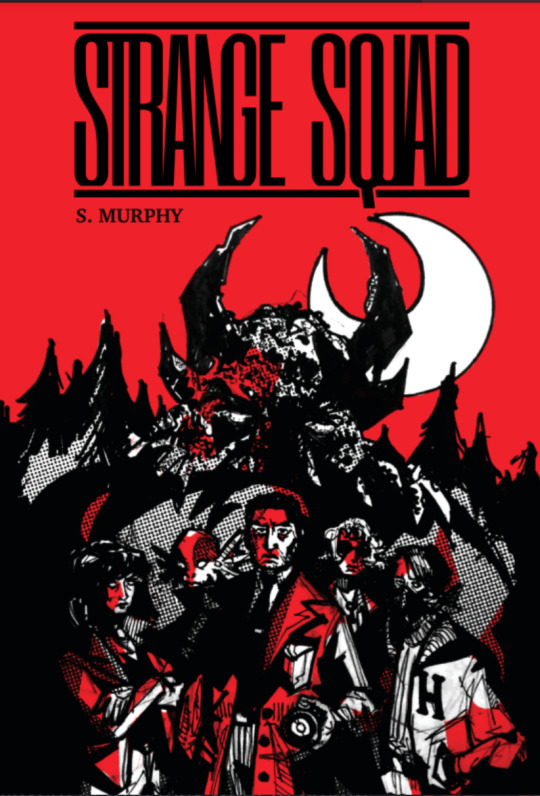



Strange Squad, by S. Murphy.
Strange Squad is a game about weird, powerful individuals known as 'Agents' investigating and solving issues involving 'Aberrants': Paranormal creatures, beings, and phenomena that defy logical explanation. Agent's seek to uphold The Veil, a layer of secrecy that keeps the public from learning about these fragments of unreality, for their sake and ours.
I like the focus on keeping things secret here, which is a strong through-line in Men in Black. This game uses Aberrations instead of aliens, so you’ll have the same task of converting some of the lore to make sense for the MIB universe. The resolution mechanic involves a d100 and rolling under a target stat, as well as a Cool track that indicates how good your character is at keeping it together in stressful situations. I think the biggest downside to this game in regards to what you’re looking for is the fact that even though you can theoretically alter the tone, the Cool mechanic points towards your characters working in a dangerous job that wears on their psyche, while I remember MIB being more about being a talented agent whose fun interactions with various aliens is the highlight of their job.
External Containment Bureau, by Mythic Gazetteer.
I’ve recommended External Containment Bureau plenty of times in the past, so I don’t want to keep recommending the same thing, but I do think it’s worth checking out, mostly because it’s very good at letting the players determine the tone. The agency’s goal of identification, containment and obfuscate allows for broad interpretation. Identification might just mean tracking down phenomena and figuring out which alien race is connected to it. Containment might involve talking the aliens down from their current course of action. Obfuscation might be using the neutralizer, but it might also be coming up with explanations for a giant crater where a gas station used to be, or filling out paperwork that accounts for a family’s sudden change in number of children.
The other thing that ECB really has going for it is the theorize roll. This is a chance for the players to come up with the solution to their presented problem collaboratively, but it also clearly lays out the primary focus of the game: solving a mystery. Your character’s primary goal isn’t to win by force, it’s to figure out what the heck is going on. And that feels pretty true to a lot of the story beats in MIB.
DPIC: Department of Paranormal Investigation & Containment, by The Rolled Standard.
The Department of Paranormal Investigation & Containment, or DPIC, is a covert agency tasked with the hunting and capturing (or elimination) of the paranormal creatures and objects that inhabit and invade our world to protect the people of this world and keep them separate and safe.
This is a more traditional concept of paranormal agency, but if what you really like in MIB is the big chrome guns and the fights that end with the monsters exploding into goo, this has got you covered. DPIC does give you rules with the idea that the supernatural is something you’ll be dealing with, so you might need to re-tool Soul to fit in a story where the weirdness comes from alien tech rather than spooky eldritch magic. This game is meant to be a standalone system, but you can definitely see the inspiration taken from various other games, especially the presence of Fate Points.
If you want to learn more about this game, the creators of DPIC have their own podcast, The Rolled Standard. They play through a number of different games and systems, and the lore of DPIC originated and blossomed over various games that can be heard there!
Cosmic Department of Immigration, by rucun3.
During the game the agents of CDI will have to protect reality from terrible things like eldritch horrors, tax evaders and tourists, and they will do that through boring bureaucracy! It doesn't help that the agents themselves can be as weird as the candidates they are screening. They will have to follow the maze-like rules and guidelines while at the same time making sure no one will destroy the very fabric of reality!
This is 2 pages of instructions on how to fulfill randomly determined requirements in a bureaucratic capacity. Your characters will hail from a specific department and receive 3 skills. There is always one skill that your character is not proficient at, and I think that encourages party balance. This game is only 2 pages, so it spends most of its space teaching you about the possible NPCs that you’ll come in contact with and what the play loop will look like. When it comes to resolution however, it doesn’t look like there’s any randomized resolution mechanic - it looks like your characters may be tasked with finding creative ways to use their abilities to solve specific quandaries without having to roll dice or pull cards.
I’m mostly pulling out this recommendation because most of the games that deal with paranormal society assume that the phenomena you deal with are threats - but in Men in Black, plenty of the aliens you are talking to are just regular people who have moved to a different planet, and sometimes have hiccups along the way. The Cosmic Department of Immigration brings a level of mundanity to the genre that I don’t see in a lot of paranormal games.
Other Recommendations
If you want more games with cheesy action and fun one-liners, you might also want to check out my Pulp Fiction recommendation post.
If you want more games about keeping a secret world secret, you might want to take a look at my Paranormal Agents recommendations.
81 notes
·
View notes
Text

THE LONG WAY HOME | One
<- Previous
Hi, hello, it's been. A very long time. Well over a year, I think? I finally have the second part! I'm so sorry it took me so long, life and full time university have been kicking my ass.
I haven't done writing in a long time, so it felt stiff and hard to get through, and only half of it is actual whump, but the rest sets up the story.
I really missed writing it, though. I hope you enjoy!
CW: BBU/BBU Adjacent, pet whump, pet training, collaring.

1: Nine Hundred and Thirty-Three
After:
"Get on your knees.”
"What? No, please, I don't -"
"Knees."
He drops to the floor to avoid the baton that this man keeps touching the handle of, looking up at him from below with his hands in his lap, fingers twisting into the shitty thin fabric of his shirt. Maybe it will rip. He doesn't want it to. It's the same one he walked in with, and he's getting the feeling that he won't get it back again if it breaks. He digs his fingers in tighter, anyway, unwillingly.
"I need to - please," he tries again. He needs to go home. His voice is hoarse, rough from the night of pleading with the empty room, tucked into a corner, fighting waves of exhaustion with terror, trying and failing to keep his eyes open. He'd scrambled to his feet when the door opened, desperate for someone to talk to, to reason with, to see that he wasn't supposed to be here -
And now he's on the floor again.
He swallows, mouth dry. "This was a mistake."
The handler ignores him, looking over him like he's assessing him for something, then sighs, mostly to himself. "Okay. So, Domestic."
"I'm not meant to be anything-"
"You don’t need to speak unless you’re spoken to."
“Please,” he whispers, but the look the handler shoots him is enough to make him close his mouth. Something flashes, in the back of his mind. A hand through the air, a stinging across the side of his face. He flinches, but the handler hasn’t moved. Every part of him is screaming that he’s done something wrong, that he needs to hide away and wait until it dies down, until it’s safe again - but there isn’t anywhere to hide here. Just white walls and a heavy door. God, he hasn’t felt like this in years. It’s hard to breathe. Like a hand around his throat.
The handler lets a moment pass, and then two, and when he’s been sitting quietly for long enough, he speaks again. “My name is Handler Phillips, I’ll be your primary Handler for the duration of your training. You are WRU Trainee 297933.”
“I’m not.” It’s whispered, terrified, but he can’t just… give up. There has to be someone who will hear him out. There has to be some way to go home. “My name is-”
“You don’t have a name, you have an identification number.” The handler sighs, and crouches down so they’re face to face. “Look. I don’t want to do this the hard way, and I don’t think you do, either. You’re gonna have to work with me.”
“I’m not meant to be here.”
"We're just doing intake today, alright? Do you know what that means?"
"I want to go home." He doesn't want to do intake, he wants to go back to where he lives and curl up in his bed and never take another stupid fucking bet in his life. He's supposed to be walking back through the door and gloating about his victory right about now. Yesterday. The day before? How long has he been here? "Let me go home."
"I can't do that, mate. I have a job to do, and so do you." The Handler stands and unhooks something from his belt. "This is a collar. It will be yours. It's fitted with…"
The Handler's voice fades into the background behind the ringing of his ears and the bile that rises in his throat. A collar. Fuck, no. Fuck that.
"No," he interrupts. "No. No. You're not putting that on me. Let me go. I need to go home.”
Handler Phillips sighs again. “297933,” he says.
“That’s not my name.”
“It’s your WRU identification number. The collar is mandatory; it’s part of your training.”
“No.” The handler’s fingers touch, briefly, the handle of the baton. He draws back into himself, swallowing thickly, eyes on the floor. “Sorry,” he says quickly. The words taste sour. “I’m sorry.”
Another sigh from above him.
“You’re okay. I’m not going to hurt you.” The handler hesitates, like he isn’t meant to continue. “I know this is scary. Take a breath.”
He draws in a breath that burns the whole way down.
“Think you can sit still enough to let me put this on you?”
“I don’t want to,” he whispers.
It happens anyway. The fight just… leaves him. He sits and trembles on the floor while Phillips slides the thick collar around his throat and clips it into place with gentle hands.
*
Before:
They’re all at Nell’s house.
They’re always all at Nell’s house, because she’s the only one of them with dogs, and with a couch, and with more than one shitty, battered Wii controller like Benny has. Nell only has two, but that’s double Benny’s, and the rest of them have none, so Nell’s place is the place to be.
They’re playing Mario Kart while they wait for Benny. Rhys is sandwiched between Luca and the arm of the couch, and one of the dogs has its head resting on his foot, and he can’t even move, because it’s Luca, and he’s got his legs slung over Rhys’s lap and his head pillowed on his shoulder.
Luca jerks his arm, swerves, and runs his Yoshi off the side of the track right as Matteo wins the race. Rhys jabs him in the side. “My go.”
“What – that doesn’t count!”
“In what world does that not count?” Rhys already knows he’s going to lose the argument, but he entertains it anyway. He rarely actually plays Mario with the group, even though they say they’ll swap controllers after every race. Matteo’s already clicked his controller into the wheel attachment and handed it to Owen. Rhys usually hands off his turn to Luca and watches as he comes dead last every single time.
Luca’s opening his mouth to start the usual ‘I’m going to get it next time’ spiel when Benny waltzes in through the front door with his arms full of Nell’s mail.
Rhys raises an eyebrow at him. “You know that’s illegal, right?”
Benny, mouth full of – something, what the fuck is he eating this time? – says, “Huh?”
“Opening someone else’s mail.”
Benny rolls his eyes and dumps the pile of envelopes – bar one – on Luca and Rhy’s laps. “Helenaaaa.”
Nell’s voice comes back from the kitchen, instantly dry, wary. “What do you want from me?”
“I have something for you.”
“I swear, if you’ve been going through my mail again - ”
Benny darts off, cackling like an idiot, and Nell – also like an idiot – chases after him. Rhys shoves the pile of mail off his lap, and it clatters to the floor, all over the dog.
“… Sorry, Benedict.”
“You’re so mean to her,” Owen says from the other side of the couch. “Come here, baby.”
Benedict heaves all god-knows-how-much of her entire great dane self off the floor and meanders over to Owen. He’s already got Chef curled up with his head shoved under his rollator, and Benedict slumps at his feet and goes back to sleep.
“Thief,” Rhys says. “You’re a dog thief.”
“You dropped mail on her head!”
“Weird mail,” Luca muttered, leaning down to snatch an envelope off the floor. “The hell is this?”
It’s a thick white envelope, decorated in gold trim, a wax seal on the back – and it’s snatched from Luca’s hand as soon as Benny swans his way back into the room.
“Whatcha got there, Luca?”
Luca snorts. “Ask Nell, it’s hers.”
Benny does not ask Nell. He never does, but Nell hates opening her own mail, so she shoots Rhys an exasperated look and slumps down on the couch with Matteo.
“We seem to have abandoned Mario,” Matteo muses as Benny tears open the envelope. He doesn’t even try to remove the seal. Absolute animal.
“Dear resident, we hope this letter finds you well,” Benny reads, pacing in front of them like some grandiose loser. Rhys considers tripping him. “We have recently started a movement to bring clinics to smaller cities, and we’re searching for partici- oh my god, this is that – Pet shit, right?”
Nell makes a face. “Yeah, they’re building some new complex for it, or something, right? I read the first one, some initiative to ‘bring business and economy flow into rural areas’ or whatever.”
“We’re not even rural,” says Matteo.
“I know. God, I thought I unsubscribed from their mailing list. Just tear it up, Benny.”
But Benny’s eyes have gone wide. “Holy shit, have you seen how much money they offer you?”
Rhys snatches it from Benny’s grip. Holy shit was right. The number is in the high ten thousands – more money than any of them have seen in one place in their lives.
“I want it,” says Benny. It’s always Benny who starts this shit. Rhys can practically feel his brain turning.
Luca laughs. “You want to be someone’s house pet, Benny?”
A grin, a shrug. Benny’s never been the type to admit that he’s wrong. “Why not? Cozy up on the couch, no job, no bills.”
“Dumbasses,” says Nell, taking the envelope off Rhys and ripping it in half.
“You can’t tell me you don’t want that kind of money, Nell.”
“What am I gonna do with the money if I’m signing up to their program, Benjamin?”
There’s a lull. It should be the end of it. It should. But Benny is Benny is Benny, and Benny doesn’t know when to stop.
“... I reckon I could get the money, anyway.”
“You’re a coward,” Rhys says, because he’s just as bad as Benny, “and a liar.”
Luca jabs him in the side.
Benny’s eyes narrow, and he squares his shoulders like he always does when he thinks that he’s been challenged.
“Wanna bet?”
Taglist (please ask to be added or removed!): @whump-for-all-and-all-for-whump @whumpinthepot @whumpcereal @whumpsday @whumpworld @littlespacecastle @anonintrovert @honey-is-mesi @warm-my-whumpee-heart @whumping-seven-days-a-week @alexmundaythrufriday
#it's been a LONG time so i understand people no longer being interested#but i had a random burst of inspiration#this is the first writing i have finished in a long long long time#i hope it's alright!#pet whump#bbu#box boy universe#whump#whumpee#whump writing#writing: tlwh#writing: the long way home
37 notes
·
View notes
Text



Over the long weekend, I taught a couple of my field classes. Sunday was the field portion of the two-day Nature Identification for the Amateur Naturalist class (the next session of which will be the first weekend in July, if you're interested.) Among the many other nifty flora, fauna, and fungi we observed, we also found some great feathers!
The first is from a Cooper's hawk (Accipiter cooperii) (likely juvenile secondary, according to the USFW Feather Atlas.) We actually got to see the bird that shed it, as a pair were courting far up in the trees above us--really cool to watch!
The second one is a turkey vulture (Cathartes aura) primary that some other park visitor had left tucked into the tree just so. And the third is a primary from some flavor of dove (Columbidae spp.)
It was a great opportunity to talk about how even though we may not observe an animal directly, we can still often find signs that they were there--feathers and fur, prints, scat, claw or antler marks on trees, etc. There is a lot of storytelling in nature interpretation, and these little clues are a great way to spark a tale of curiosity.
(Just as a reminder, it is against federal law in the US--the Migratory Bird Treaty Act--to possess the feathers of almost any wild bird. There's no way to distinguish a feather naturally molted, and one that was taken from a poached bird, so the law errs on the side of protection.)
#feathers#birds#wildlife#Cooper's hawk#turkey vulture#Columbidae#nature#nature identification#animals#science#conservation#ecology#biodiversity#Aves
183 notes
·
View notes
Text
Thoughts While Watching Gilmore Girls: 3x8 Let The Games Begin (Aka Let The ShitCircus Begin) (Send In The Clowns) (Send Help) (Part 1)
You can read my thoughts on all previous episodes in my Pinned Post.
Ladies and Gentlemens, do you know what time it is? it is officially Literati Kickoff Time.
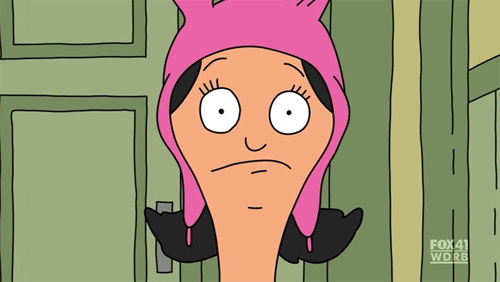

To get everyone up to speed, in the last episode, Rory recieved a Public Dumping for the Ages, Dean has stepped down as Rory's Primary Male Life Ruiner and handed that crown to Jess, Shane has been eviscerated into a bloody pulp, Lorelai and Luke both missed the showdown at the DM and so Lorelai learned about this tea off-screen sometime between the last episode and this one. It's yet unclear whether Lorelai learned what happened through second hand gossip or if Rory dusted off her Season 1 Balls of Steel and had the courage to inform her mother that Dean was out and Jess was in.
Episode Opener: we see Rory and Lorelai walking through town shortly after the dance marathon, complaining about their sleep deprivation and achy feet. ("At least you bitches still have your feet," says Shane's dismembered ghost, looking down at her new webbed swan feet).

What is this shirt? It looks like an octopus ejaculated on this shirt.
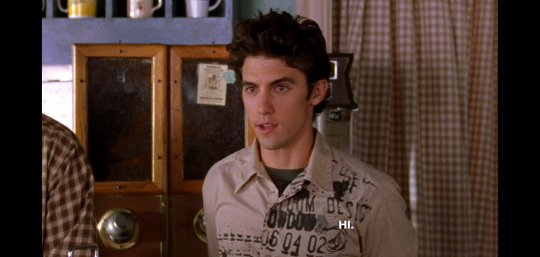
Hey baby hey baby hey!
J: Hi
R:Hey
J:Hi
Lor: Hi (Who told you you could speak? Butt out, bish)
Luke: Hi
Jess: Hi
R: I have to get to school.
J: Me too.
R:Bye
J:Bye. Bye.
Lorelai: Bye (bish, I swear...)
R: Bye
Luke: Bye
Jess: Disappears

Only THE CUTEST THING THAT HAS EVER HAPPENED?! That was so cute, they should be immortalized into a pair of Precious Moments figurines. The little plaque on the figurine would be titled "Idiots In Love."
So naturally, a certain Grinch in a lavendar blouse has a problem with this and it only further reassures her that Jess is nothing more than A Sex Criminal (who would never murder anyone).
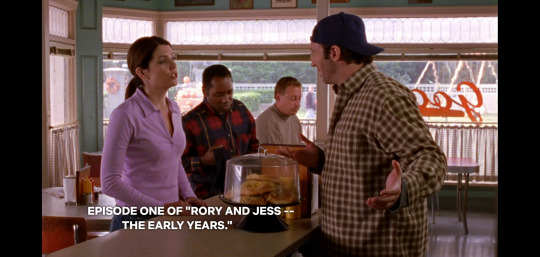

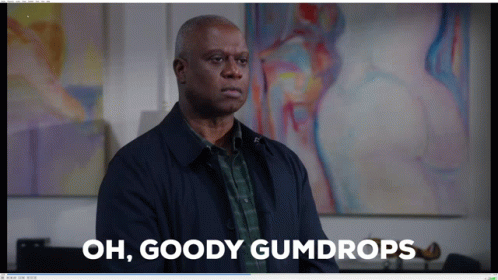
Yay.
Lorelai and I are both crying on the inside over this development, but for vastly different reasons.
Anyway, look at her hanging her head! This bish is in mourning! Look at how depressed this bish is! Hahaha! Get SAD, BISH! I WILL LICK YOUR SALTY, SALTY TEARS! Ahem.
I haven't seen such a somber delivery since the medical examiner delivered the news to Shane's parents that he had positively identifed her mutilated corpse.

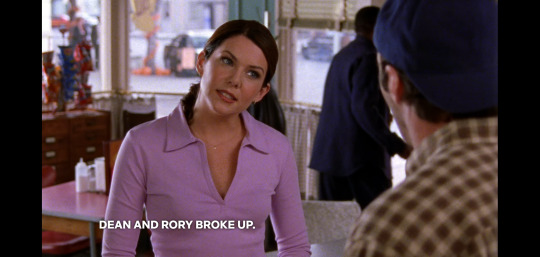
Who will visit my home and sift through my panty drawer now?
Luke: What happened?
Lorelai, somber as a funeral director: Jess happened.
Luke, uncharacteristically giddy with excitement: Wow! WOW! This is great! Wow! Rory and Jess! Jess and Rory! This is great! Don't you think this is great!
Honestly Luke and Lorelai reflect both sides of my conflicting feelings about the Literati Shit-Circus.
Lor: "I'll tell Dean you said that."
I'm sure you will before the next time you gargle his dick.
I think it's the next episode where Lorelai tells Dean, "Just because you and Rory broke up doesn't mean we did." #Sick
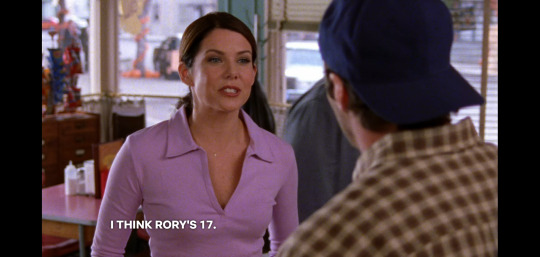

MOMMY FAIL! Rory is 18. She's a fucking adult so leave her alone. Anyway, what does that mean? I think it's code for "It's about time Rory dated a boy who knows how to remove a bra.'
Luke: I know Jess is tough (LOL, yeah, he's a real toughie, just look at that last exchange) but he likes Rory and Rory's a good kid. Her good will rub off on him.

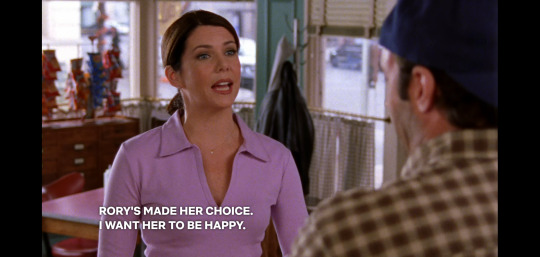
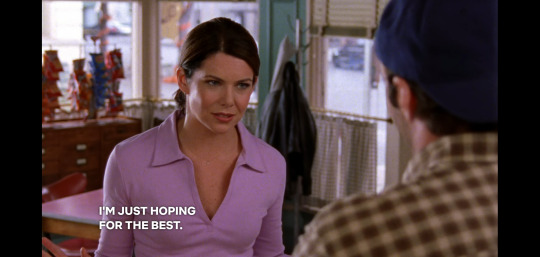
You are so full of baloney. You're a Baloney Superstore. You are the Walmart of Baloney.
Oh, this episode contains multitudes. Lorelai is insufferable on not just one but two fronts. Heavens to betsy. This is the episode where she has a shit-fit over Richard taking Rory to interview at Yale. One of the most ridiculous Lorelai tantrums I can ever recall, at least in the earlier seasons. Maybe not as insane as "I'd rather my child and I be homeless than accept a loan from my mother to save my termite infested house" but it's up there in the top 5 for me.

I am so brave.
Ar FND, Richard invites Rory to embark on said Road Trip to Yale, which shouldn't be a big deal for a child with any other mother besides Lorelai Gilmore, but this is Rory so she is shaking lke a flu stricken chihuaua at the thought of her mother finding out she would ever deign to visit a school endorsed by her grandparents. She reluctantly accepts, then quietly pees her pants.
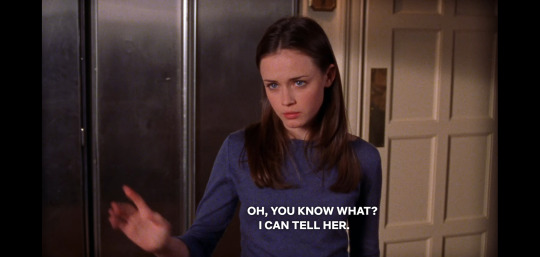
God speed, girlypop.
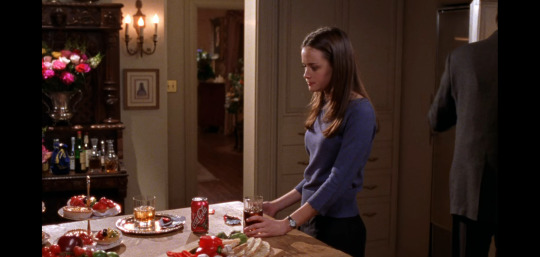
Fun with Product Placement time: Rory went to fetch a soda from the kitchen, and my immediate thought was: "These rich bitches better have name brand Coca Cola in their fridge, and not that odd Hansen's soda that Rory is always drinking", and they do. A real honest to god prominently labeled Coke can.
Girlypop here is feeling the heavy weight of possibly displeasing her mother in both her romantic and academic choices. She has a lot on her plate right now.
While the car is parked in the Gilmore Grands driveway after FND, girly pop musters up the courage to tell Lorelai "Grandpa wants us to go on a road trip to Yale" which causes Lorelai to huff and immediately exit the car. She begins storming back into the house, intent on demanding that her father explain this unbelievably callous and cruel attempt to brainwash her daughter into considering another school besides Harvvard.
Rory stops her at the porch. where a lengthy argument ensues. Rory has to (once again) dig in her heels to defend her position against Lorelai over something so STUPID. I am really sitting here watching Lorelai and Rory go back and forth forever just because (ADULT) Rory wants to visit a college campus at the invitation of her own grandfather. Lorelai even calls Richard a "master manipulator" for this evil plot.
You know what Rory, stop asking Lorelai for her input. Since you don't have a car, just hop on a bus to New Haven and just fucking go.
After comparing the city of New Haven to leftover sludge at the bottom of a coffee pot, Lorelai decides she's going to accompany Rory on the trip anyway, even though its been made quite clear she does not have to go (just like the Sherry Baby Shower). In both instances, Lorelai's presence will ruin everything.
Per @frazzledsoul: "Lorelai is so spoiled here. Imagine being a parent of a teenager and your worst problem is what Ivy League school your kid goes to." Amen.
The rest of this episode promises to be a complete shitshow of epic proportions. At least the next episode is "Deep Fried Korean Thanksgiving", one of the best.
#gilmore girls#gilmore girls season 3#denise rewatches gilmore girls#let the games begin#ltgb#literati#jess mariano#rory gilmore#luke danes#send help
25 notes
·
View notes
Note
Hope you don't mind the amount of requests! The way you write is simply amazing!! May I put in another request? Garrett stumbles upon his mate having already been bitten by some vampire(maybe he spooks them off or it was scares off by someone else.) Either way she's too far to be saved and turned back into a human. When she awakes she has the ability to freeze time around her making it seem as if she disappears.(she can have someone with her in frozen time if she's touching them in some way). She would be only able to do it for short times at first but like Bella's ability it would build up.
Oooh how interesting :)
↳ too far gone ↲

➘ summary : Garrett happens upon his mate already bitten and though he can’t slow down the transformation he can help her after she turns to the best of his abilities
➘ Garrett x reader, twilight x reader
➘ a/n : it’s funny because most of my twilight stories in my masterlist are all requests except for one that I wrote about Marcus also I will be rewriting my twilight masterlist to fit stories into the right categories

Garrett, a rugged and free-spirited vampire, roamed through the dense forest, his senses alert to every sound and scent. He had spent years traveling alone, seeking solace in the untamed beauty of the wilderness. Tonight, as the moon cast an ethereal glow over the landscape, his journey took an unexpected turn.
The distant rustling of leaves caught Garrett's attention, his instincts honed by centuries of survival. He approached the source of the sound cautiously, only to find a fallen backpack and a crumpled ID lying on the forest floor. His gaze narrowed as he picked up the identification card, revealing the name (y/n).
His eyes flicked up to see a figure lying a short distance away. He moved swiftly, his heart racing as he realized the young woman had been attacked by a nomad vampire. The scent of blood filled the air, and her ashen skin bore the telltale mark of a bite.
With a growl, Garrett's presence startled the nomad vampire, who fled into the night. His primary concern, however, was the injured woman before him. Kneeling beside her, he assessed her condition. She was pale and weak, her breath shallow.
Gently, Garrett picked her up, cradling her in his arms. He could sense that her transformation had already begun, and there was no turning back. Determination fueled his steps as he carried her deeper into the forest, away from prying eyes.
Hours passed as Garrett settled in a secluded hideout, far from human civilization. The woman lay on a makeshift bed, her transformation now fully underway. Her features grew paler, and her heartbeat slowed to an almost imperceptible rhythm.
Sitting beside her, Garrett watched over her vigilantly. The moonlight filtered through the trees, casting a gentle glow on her features. He traced the curve of her cheek with his finger, his gaze filled with a mixture of concern and awe.
As the night wore on, (y/n)'s body went through the final stages of transformation. Her breathing ceased, replaced by a quiet stillness. Garrett's heart ached for her, knowing that she would wake up in a world forever changed.
When the first rays of dawn began to break through the darkness, Garrett's keen senses detected the subtlest shift in her presence. Her eyes fluttered open, revealing a new shade of crimson that mirrored his own. She blinked, her gaze locking onto his.
(y/n)'s voice was barely a whisper, filled with a mix of confusion and wonder. "Who... who are you?"
Garrett's lips curved into a reassuring smile. "I'm Garrett. And you are safe."
A sense of realization seemed to dawn in her eyes. "You saved me?"
He nodded, his expression tender. "Yes, from the nomad who attacked you."
As (y/n) processed the information, her gaze met Garrett's, and something unspoken passed between them. A connection that transcended words, a bond that marked them as something more than strangers.
With a soft exhale, she spoke, her voice carrying a mixture of acceptance and curiosity. "What am I now?"
Garrett's fingers brushed her cheek gently. "You're a vampire, like me. It's a new beginning."
Her gaze held a mixture of uncertainty and determination. "I have so much to learn."
Garrett's smile was kind, his tone reassuring. "I'll be here to guide you. You're not alone in this."
As the sun's rays painted the forest in shades of gold, Garrett and (y/n) faced the dawn of a new era together. Bound by fate and an unbreakable bond, their journey as companions in the immortal world had just begun.
(Y/n) adapted to her new life as a vampire under Garrett's guidance, she began to explore the extent of her newfound abilities. The pair traveled together, embracing their nomadic existence, and (y/n) discovered a unique power that set her apart from other vampires.
One evening, as they navigated a dense forest under the moonlight, (y/n) stumbled upon a small clearing. She felt a curious urge, an inexplicable pull deep within her. With a tentative touch of her fingers to a nearby tree, time around her seemed to slow and eventually come to a complete halt.
Garrett's movement froze mid-step, his expression a mix of surprise and curiosity. (y/n) marveled at the stillness that enveloped her. She realized that she could move freely within this frozen moment, her actions unaffected by the passage of time.
Experimenting further, (y/n) reached out and touched Garrett's hand. As her fingers made contact, he, too, became enveloped in the frozen time bubble. They stood together, unaffected by the world around them.
With a sense of exhilaration, (y/n) studied the frozen environment. Leaves hung suspended in the air, caught in the midst of their descent. Moonlight glistened on droplets of dew, creating a crystalline tapestry around them.
Over time, (y/n) practiced and refined her control over this unique power. She found that she could only maintain the frozen time for a limited duration before the bubble burst and time resumed its natural flow. The sensation was both freeing and exhilarating, a chance to pause the world and savor moments in their stillness.
As she grew more proficient, (y/n) and Garrett would occasionally venture into a frozen moment, stealing glimpses of the world in its suspended state. They would hold hands, united in their secret haven of frozen time, cherishing the solitude and connection it provided.
One evening, as they stood together in the midst of a frozen forest, Garrett looked at (y/n) with an affectionate smile. "You truly have a gift, (y/n). This ability is unlike anything I've ever encountered."
“I’m sure that over time it will grow just like you.”
She returned his smile, her eyes reflecting a mixture of pride and gratitude. "It's as if I can carve out a space just for us, where time stands still."
Garrett's fingers brushed against hers, his touch warm despite the frozen surroundings. "And in that space, we can share moments that are uniquely ours."
Over time, (y/n) and Garrett's bond grew stronger, deepening through their shared experiences and unique abilities. As they traveled the world together, their frozen moments became treasured respites from the fast-paced existence of immortality. In each other's company, they found a sense of solace and belonging that transcended the boundaries of time itself.

#x reader#x reader oneshot#x reader one shot#x reader requests#garrett twilight#garrett imagines#garrett x reader#garrett imagine#garrett x y/n#garrett x you#twilight x reader#twilight x y/n#twilight imagines#twilight imagine#twilight masterlist#twilight
143 notes
·
View notes
Note
Do you think that Rey's story (excluding episode 9 'cause that was a shitshow) could be interpreted as a Cinderella/Ash girl story?
I hope you realize asking me this is like throwing chum to a shark 😈. But the short answer is yes, to a point.
The long answer is more complicated, so to begin with, let's consult the Cinderella bible:
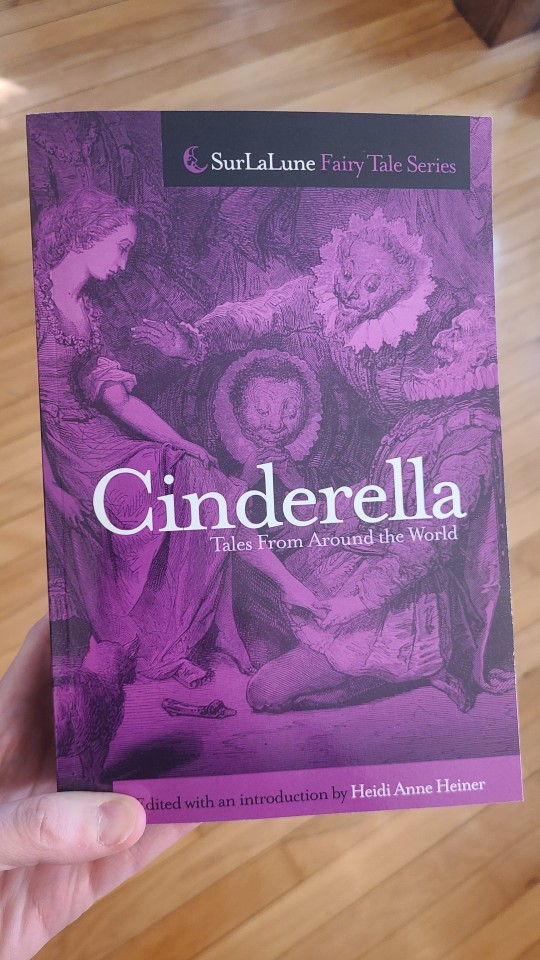
According to the Aarne Thompson Uther Index, there are five primary motifs to a Cinderella tale:
Persecuted heroine, usually by family
Help or helper, usually magic
Meeting the prince, usually with true identity disguised
Identification or penetration of disguise, usually by means of an object
Marriage to the prince
Rey is abandoned by her family, which is a form of persecution, and harassed by the inhabitants of Jakku like Unkar Plutt. Thus she clearly fulfills the first item.
As for meeting a helper, there are several for her, including Han Solo, Maz, Luke, and Leia. Any or all of these may be considered fairy godparents in the way that they offer her wisdom and material help. Further, except for Maz, they all die in the course of the story, which is consistent with many Cinderella tales in which the helper dies and their bones continue to offer wisdom and comfort to the heroine.
Next, meeting the prince. I mean
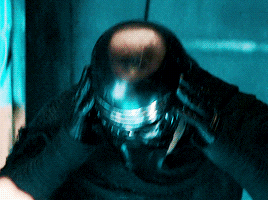
To the extent that Rey is "in disguise' here, it would be the extent of her force powers, her destiny as Ben Solo's dyad mate, and her role as the heir apparent to the Jedi (chosen by the Force to wield the legacy saber), all of which are obscured from Kylo Ren when he discovers her in the forest. Further, she is grimy and covered in desert sand, similar to how Cinderella is smeared with ashes that hide her true beauty.
So now an object penetrates the disguise. This is obviously the Skywalker lightsaber, which reveals Rey to be everything listed above, especially when she calls it to her on Starkiller Base, and again when she wields it on Ahch-to.
And lastly, marriage to the prince. As many others have pointed out over the years, Rey and Ben have almost too many symbolic marriages to count in the course of the sequel trilogy. They're extremely married, the Force said so.
BUT WAIT! Go back and look at that list again. Who ELSE fits all those criteria?
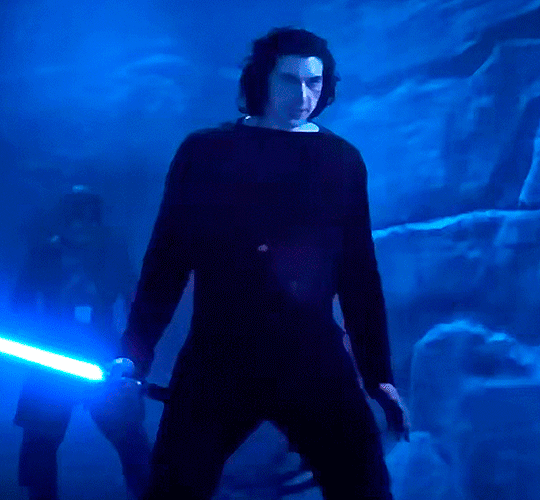
It's our boy! Consider:
He is indeed persecuted by family, most notably when Luke momentarily considers killing him.
Ben's helpers are both dark and light, as Snoke/Palpatine guide him in the dark while Luke guides him in the light (poorly). But note again what I said above about the bones of the mentor continuing to offer guidance and comfort after their death. Who should appear at Ben's lowest hour but his departed father, Han Solo? With a message of love, acceptance, and encouragement, Han's memory (because in fairy tales, bones contain memory) encourages Ben to at last cast off his beastly skin and become who he always was.
Next, meeting the prince/ss in disguise. He's wearing a literal mask when he meets Rey, so yeah.
An object penetrates the disguise? Rey slashed his face with the legacy saber, thus symbolically peeling away his mask. And I've argued before that the stabbing in TROS (which I still HATE, btw) is another cutting or burning away of the beastly skin.
And lastly, marriage to the prince/ss. As previously stated, that happened. Many times.
So yes, the Sequel Trilogy can definitely be considered a Cinderella story, with but one glaring issue: Cinderella's husband usually doesn't die at the end. But that's another topic that's been done to death, so let's all just read some more fanfic and forget about it. 👑 Thank you for the ask, this was fun!
#reylo#reylo meta#star wars#star wars meta#sw meta#star wars sequel trilogy#sequel trilogy#sequel trilogy meta#sw sequels#rey x ben#rey of jakku#ben solo#kylo ren#cinderella#aschenputtel#fairy tale#fairy tale meta#folktales#folktale types#folktale motifs#atu 510#aarne thompson uther#han solo#luke skywalker#leia organa#maz kanata#fairy godmother#my meta
97 notes
·
View notes